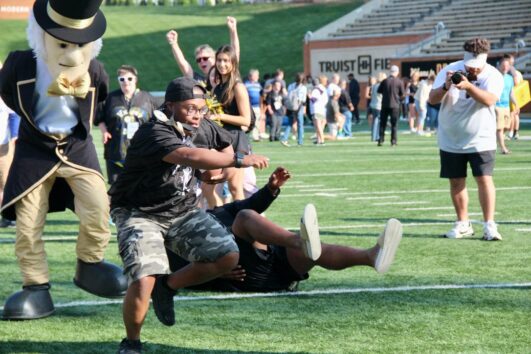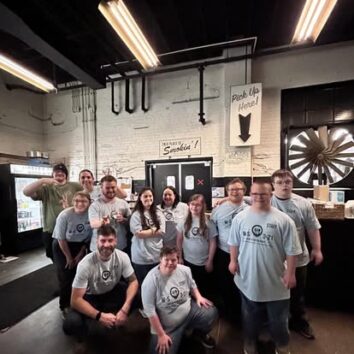Exclusive Interview with Down Syndrome Association of Greater Winston-Salem Executive Director – Jay Callahan
The Down Syndrome Association of Greater Winston-Salem is growing under the leadership of Executive Director, Jay Callahan. DSAGWS has expanded service to its community, both geographically and in breadth of service. Programs include a unique partnership with Wake Forest University.
Mr. Callahan met with GLOBAL Vice President – Strategic Alliances, David Tolleson, to talk about the organization, its recent initiatives, and how an unlikely career path led him to where he is today.

DAVID: Tell us a bit about yourself and how you got involved with the Down Syndrome Association of Greater Winston-Salem?
JAY: I grew up in the area but then went off to West Virginia University. I was the fourth generation to go to school there and my grandparents lived in Morgantown, which was nice, especially when I needed a good lunch (or laundry done!). I was a journalism major, but when I came home to Winston-Salem, I started working as an Exceptional Children’s program assistant in our local school system, while also coaching high school soccer. My mom was a speech therapist and oversaw Camp Imagine, working with children with autism. I took over the running of the camp for a couple of years along with another teacher. Around that time, I got a job coaching soccer at Salem College. It wasn’t full-time to begin with, so I also did ABA tutoring, which is how I met my wife – she was doing ABA tutoring, too. In a matter of a few years, I went to coaching full-time, got married, and had our daughter and then our son. With all that going on, I decided to write a book. It was based on a true story of a man who murdered the air traffic controller whose negligence led to the death of the killer’s wife and child. It was a busy time for our family!
Around that time, I started a blog – The Man Van – back when blogs were pretty big. I went around town in my minivan and did different things, like I would take dogs that needed adopting with me while doing Meals on Wheels deliveries, which brought publicity to both causes. During that time, I became acquainted with the Piedmont Down Syndrome Support Network (PDSSN) and did projects with them. I had gone as far as I could with my coaching career at a Division III school, so was looking to make a change, possibly to coach at a bigger school. Instead, PDSSN’s Executive Director stepped down and so we began talking and I was hired in 2017. The Board kind of took a chance on me – I didn’t have any non-profit experience – but I think it’s worked out!
DAVID: I would say so! It sounds like even though you didn’t have nonprofit work experience, you certainly had a heart for nonprofits. Where did that come from?
JAY: Partially from my mom and partially from my dad. He was a big part of the downtown revitalization in Winston-Salem. So, seeing her working with children with autism and him serving on a bunch of different boards, set an example for me.
 DAVID: Tell us a bit more about the Down Syndrome Association of Greater Winston-Salem.
DAVID: Tell us a bit more about the Down Syndrome Association of Greater Winston-Salem.
JAY: One of the first things I wanted to do when I came on board was to rebrand the organization. As you know, the piedmont is a very large geographic area covering several states. My mother and I both worked in the autism community for several years and had never heard of PDSSN. Like me, some of our Board members and volunteers also thought a name change might raise our profile locally. So, we spent a large part of my first year re-branding as the Down Syndrome Association of Greater Winston-Salem and launching a new website. Today, we serve ten counties, primarily to our north, west, and south, as Greensboro and High Point are nearby to our east, though we welcome folks from those communities, too.
In 2021, we started our Starlight Gala, which is in May. It has become our largest fundraiser, but it’s also a way to promote members of our community. The gala’s success has helped fuel new programs. We added an art program with Sawtooth, a local arts center. We try to support each age group, so we have a “Tea & Tots” program for children birth to 4, playtime at a children’s center for elementary age kids, “Teen Time” which involves activities like going to Dave & Buster’s or bowling, and a dance for our adults, which we host 2 to 3 times a year.
We’ve also introduced the WS321 pop-up restaurant series, where we have ten to twelve self-advocates who go to area eateries and do a shift with the staff. We promote the restaurant, and our families go to eat there, so a win/win!
We’ve had our 5k race, called the Deacon Dash, since 2017. That really started our relationship with Wake Forest University.
DAVID: Tell us a bit more about the DSA’s relationship with Wake Forest.

JAY: That’s been great and mutually beneficial. In addition to the Deacon Dash, we also have our Victory Day with the football team, which we began right after I started. We usually have about 50 of our members go out for a few hours in April. They get to visit the stadium locker room and put on jerseys, then run out of the field house with the football team on either side, the band playing and the cheerleaders cheering. After that, they break into smaller groups for a variety of activities with the football team. That’s been a huge hit and is definitely one of my favorite events. Their old coach retired last year, so we gave him an award at our gala. As it turns out, their new coach has a niece with Down syndrome, so I think our partnership with Wake Football will continue to grow. Our folks love it and it’s very popular with the student athletes, too. We’ve had ex-players who have gone on to the NFL who’ve worn our logo on their cleats for “My Cause My Cleats”.
We have 14 members of Wake’s Kappa Delta sorority coming tonight to participate in our Teen Time program. We gave the KD’s our “Buddies of the Year Award” last year, because they come work at all our events – they’re awesome!
DAVID: Having been an executive director, I know that male leaders of Down syndrome organizations are a rarity. Why do you think that is and what do you think other men are missing by not considering this career path?
JAY: That’s a good question and a hard one to answer. Men are definitely missing out. At one of the first Down Syndrome Affiliates in Action (DSAIA) Conferences I attended, I met Mac Macsovits, with whom I have a lot in common, so it was good getting to know him. Non-profits need to take a chance on finding men and vice versa. I was a college soccer coach for 12 years and I took a chance, and it has been a great experience. I think the more men that come into the field, the more men will consider the possibility. It did seem that there were more men at this year’s DSAIA Conference than I’ve seen before, so that’s promising. There are other jobs in the for-profit sector where you can make more money, so that probably accounts for part of it.
DAVID: But do you get hugged as much in for-profit?
JAY: No, definitely not!
 DAVID: We are grateful that your group is supporting the project to update and expand the GLOBAL Adult Guidelines with a generous multi-year pledge. Why is this project, GLOBAL’s research and medical care work, and our Washington, DC advocacy important to you and the families you serve?
DAVID: We are grateful that your group is supporting the project to update and expand the GLOBAL Adult Guidelines with a generous multi-year pledge. Why is this project, GLOBAL’s research and medical care work, and our Washington, DC advocacy important to you and the families you serve?
JAY: It has been important for us to focus on our local community, and we don’t have the resources to advocate the way GLOBAL does in Washington, or to work with research institutes the way you do. So, we think it’s important to support organizations that do have the resources and connections, because in the end your work is helping our members. We also do that in other ways. For example, instead of running summer camps, we give scholarships for kids to attend existing camps. We like the work you’re doing and think the best way to support that is to support GLOBAL.
DAVID: We really appreciate it. That’s similar to how we think about the work of other organizations, like with the effort to protect disability programs at the Department of Education. It just makes sense for us to support the work that NDSC is already doing in that area. We don’t have the ability to do everything all the time, so it’s just smart to support those who do.
JAY: We’re all part of one big family with the same overarching goal to help our families, so it makes sense.
DAVID: Is there anything else you’d like to share?
JAY: I really want to recognize our team. We have 23 great Board members and four strong staff members executing on our mission. They work hard. I’m very glad to have the staff I work with!
Recent Posts
- United Coalition for Down Syndrome Condemns the Rise in the Use of the R-word
- MAY 21: Local Talent with Down Syndrome, Members of Congress, and Multiplatinum Artist Phillip Phillips Headline AcceptAbility Gala and Highlight NIH Research Needs
- Medicaid Is A Lifeline for Individuals with Down Syndrome
- Exclusive Interview with Down Syndrome Association of Greater Winston-Salem Executive Director – Jay Callahan
- Bipartisan Congressional Members & Celebrities to Champion Down Syndrome Research in DC

 Experience our inspirational and groundbreaking videos and photos. Our children and self-advocates are beautiful AND brilliant!
Experience our inspirational and groundbreaking videos and photos. Our children and self-advocates are beautiful AND brilliant! Make sure your local Representatives are on the Congressional Down Syndrome Task Force.
Make sure your local Representatives are on the Congressional Down Syndrome Task Force.